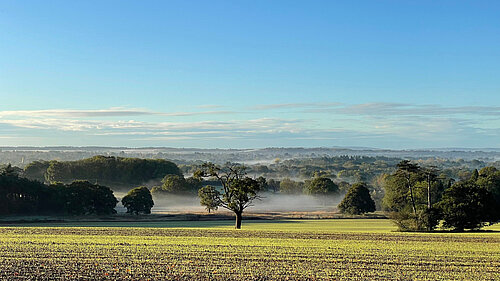COLUMN: Our climate change and nature recovery strategy

By Cllr Colette Blackburn as printed in the Thursday, 25 January 2024, print edition of the West Sussex County Times
Not so long ago, I wrote about Horsham District Council’s climate change research which took place recently among residents and local businesses. We wanted to find out how best to help residents and businesses reduce their carbon emissions and adapt to our changing climate. The analysis which I reported on has now been absorbed into our strategy and we expect to vote it through Cabinet this week.
What this means for residents and businesses is that we can build on our work in providing tailored, prioritised support and guidance. This will help to ensure that everyone is able to embrace behaviours that can help to tackle climate change because they are relevant to them, their work, their families and their lifestyle. For example, those who are in a position to retrofit their homes will find advice and support freely available; those who are able to support locally grown food sellers and engage with local repair, recycle, and refill stations will be able to easily find their nearest outlet, and those who can volunteer to help wildlife repopulate the countryside can do so through the Wilder Horsham District project. These are just some examples from a broad and varied arsenal of valuable actions, but they are indicative of a steady progress throughout Horsham district that shows that action at a local level, across the district, has a big impact.
Back in 2003, Sir John Lawton chaired a review of England’s wildlife and ecological network to see how nature could thrive despite climate change. The review was far reaching and correctly predicted the challenge that lay ahead. Solutions to the problem of significant nature decline became known as ‘bigger, better and more joined-up’ or ‘The Lawton Principles’. I believe that these principles might be as easily applied to other climate change challenges as they are to the recovery and protection of our natural world.
In particular, the ‘joined up’ part is interesting. Almost every community in our district is doing something. The beauty of it is that they are doing something that is particularly pertinent to them. You do not need much imagination or good sense to know that climate actions in an urban street in town may differ to those most likely to be seized upon by a farming community in a rural part of our district. Even clean home energy, insulation and electric vehicle charging will have location specific implications which may mean that varying timescales on uptake is sensible and to be expected. But, it is the cumulative effect of the location appropriate actions that will make a meaningful impact most quickly and leave us all healthier and better off.
Where businesses are concerned, the same thinking applies. A business that employs fewer people will have different concerns and choices to a large corporation. This week we have publicised our new Green LEAP small business grant scheme to help smaller businesses to adapt, with applications open from 1 April. Recent successful applicants for rural business funding have demonstrated that we can help in this way. For example, Jacob’s Bagels near Pulborough won an award to help install solar panels. As a result, the bakery has made inroads in its climate adaptation ambitions by powering baking equipment and ovens from cheaper, cleaner renewable energy. (Q: Are bagels baked by the sun tastier?) The lower energy bill will help this business to succeed too.
As we progress with our climate change and nature recovery strategy, we will let you know about initiatives that may help you to realise your own climate adaptation ambitions. Please keep an eye out for any local announcements, particularly from volunteer green community groups as well as your Parish or Neighbourhood councils. Check in on our website too and sign up for our monthly newsletter.
